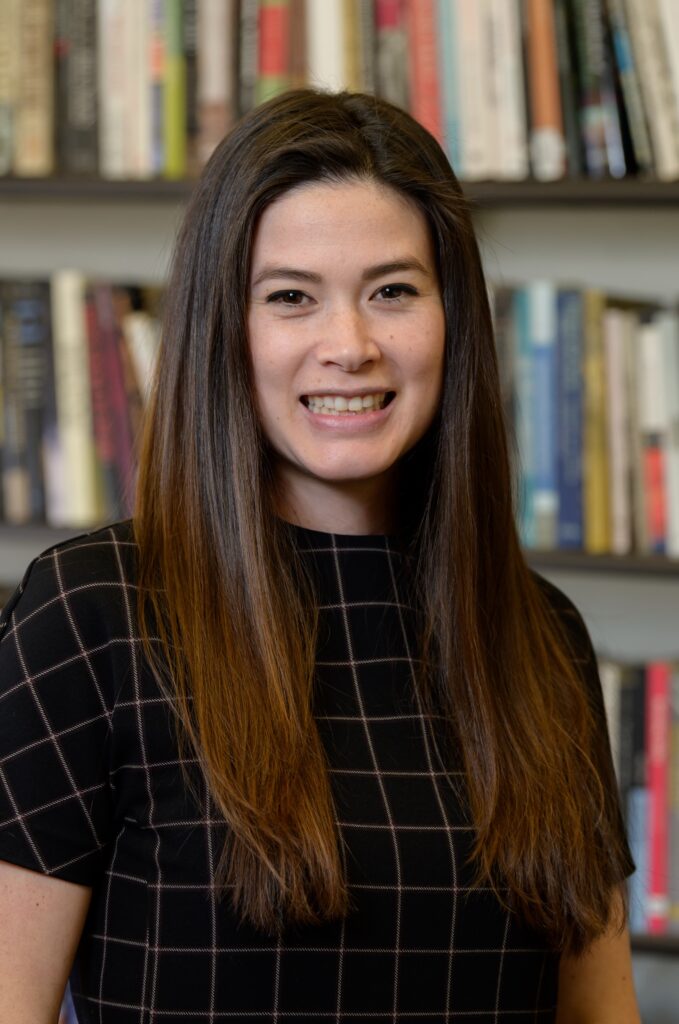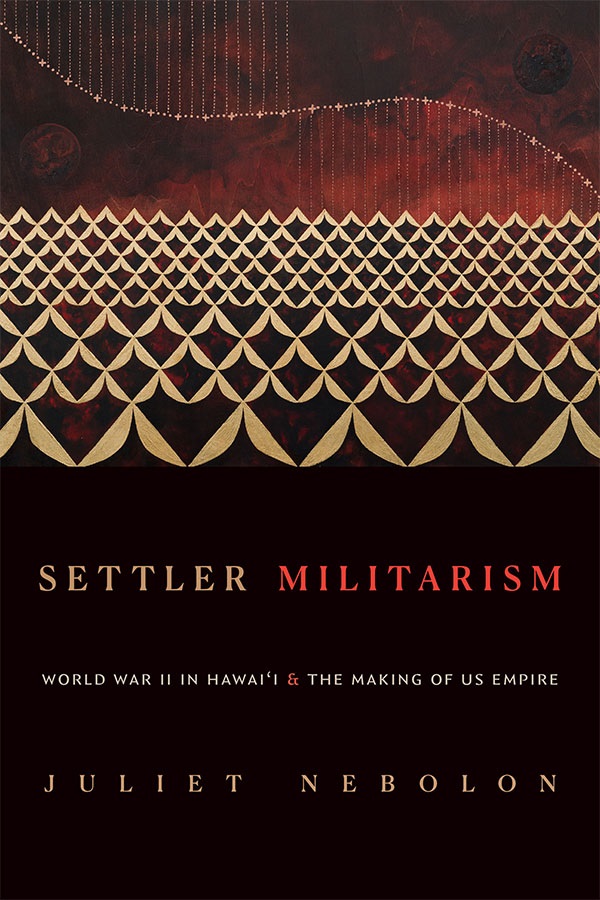American Studies Faculty Member’s Book Explores Misunderstood Histories
Assistant Professor of American Studies Juliet Nebolon discusses the World War II period in Hawaii, martial law, and settler militarism, a term she developed to describe intertwining regimes of settler colonialism and militarism. Momo Djebli ’25, who studied with Nebolon, uses concepts developed in Nebolon’s new book, Settler Militarism, in their own research.
What is settler militarism?

Settler militarism is a term I use to refer to two regimes that are often seen as and studied separately: settler colonialism and militarism. In my research, I found that they can act in unison—perpetuating, legitimating, and concealing one another.
Settler colonialism, when studied in the context of U.S. history, often refers to the displacement of Indigenous peoples and the dispossession of Indigenous land within the continental United States. Militarization often refers to aggressive military expansion and war—often excused as “necessary” or “logical”—that occurs outside of the continent. But beyond this, militarization is also the process by which military logics, force, occupation, and expansion come to be accepted as a solution or logical inevitability by the government and the general public.
But in my research, I began to see ways that these forces are actually intertwined and reinforcing of each other, particularly in Hawaii, where activists and scholars have previously drawn these connections. I began to use the term “settler militarism” to refer to how projects we associate with U.S. militarization (the building of military bases, the testing or storage of weapons, the housing of soldiers) have throughout history required the acquisition of land and the displacement of Indigenous peoples. Like militarism, settler militarism is often seen as “necessary” for security and safety, even as it exerts violence against the people and landscapes it purports to protect. In the period I study in my book—around the Second World War—this was especially true as the United States was seen as fighting a “good war” in the name of liberal democracy.
What kind of actions were seen as “necessary” during this period?
After the Japanese bombing of Pearl Harbor, the United States declared martial law in Hawaii. Under martial law, the military government had full control over civilian life in the islands. This included the modes of surveillance one might expect, such as the suspension of habeas corpus, the fingerprinting and photographing of all civilians, and nightly blackouts and curfews. But as my book explores, martial law also contributed to racialized, gendered, and colonial projects in the islands. This included the unilateral acquisition of Hawaiian land for military purposes, as well as the internment of Asian and Indigenous peoples in the islands. Blood bank campaigns promoted blood donation as a patriotic service while publicizing monthly donation statistics by race, thus contributing to perceived racial hierarchies of Americanization. Homemaking campaigns targeted Asian immigrant families and promoted assimilation to U.S. nutritional and domestic customs while masking continuing Native Hawaiian food cultures and land-based understandings of health. These projects each intensified the dispossession and exploitation of immigrant and Indigenous peoples in the islands in the name of military defense and mobilization.
How did you begin to look at this period in American history? Why did you write this book?
 My maternal grandparents and their siblings immigrated from China to the United States during World War II. This experience of wartime migration in my family left an imprint on my life, but I didn’t have the knowledge or language to fully understand this history or my biracial identity while I was growing up.
My maternal grandparents and their siblings immigrated from China to the United States during World War II. This experience of wartime migration in my family left an imprint on my life, but I didn’t have the knowledge or language to fully understand this history or my biracial identity while I was growing up.
In college, I began to take classes in American studies, ethnic studies, and Asian American studies. I started to develop the tools and historical understanding to make sense of my family’s experience and how it was linked in complicated ways with [the experiences of] so many others. We had been displaced by the violence of war, but we are also settlers on Indigenous lands across Hawaii and the continental United States.
In graduate school, I studied the histories of U.S. wars in Asia and the Pacific Islands, with a focus on the perspectives of those who had been displaced or imprisoned in the crossfire of these wars. In my studies, I came to realize that the World War II period in Hawaii was not only understudied but also broadly misunderstood. For example, there are books that state that Japanese American internment did not take place in Hawaii, but archival sources and oral histories show that this is not the case. This motivated me to research this period more closely. What other histories and experiences had been overlooked—or worse, willfully ignored—from World War II in Hawaii?
During a recent event to celebrate your book, an audience member asked how you cope with researching violent histories.
Many of us study topics that are entangled with our respective biographies, histories, or communities. That’s often what brings us to research violent or traumatic events. We are trying to understand histories or political contexts that have impacted our lives or the lives of those for whom we care deeply. As we go into the archives or talk to those who have been affected, it can be taxing and emotional work, and you can feel like you’re underneath the weight of that violence. At times like this, I remind myself that there is a political project behind my research and of the responsibilities I have to teach and write about marginalized histories.
Tell me about teaching at Trinity.
Trinity students are wonderful. I was honored that Christina Heatherton [associate professor of American studies and Everett and Joanne Elting Associate Professor for Human Rights and Global Citizenship], along with colleagues in American studies, the Trinity Social Justice Institute, and the Smart Cities Research Lab, organized a book launch for Settler Militarism at Trinity in March. But one of the most meaningful parts of this event was that it featured one of our American studies students, Momo Djebli [’25], in conversation with scholars Kēhaulani Kauanui and Jodi Kim. For me, teaching is one of the key ways that we as scholars learn to crystallize our understandings of academic and political concepts—both in our research and in our rapidly changing present. It’s part of what makes a liberal arts environment so powerful: We are always learning with and from our students.
Research by Momo Djebli ’25
As Momo Djebli ’25 was developing their thesis proposal, they had the opportunity to read Nebolon’s book, Settler Militarism, as part of an independent study. And while they expected that their thesis would explore something at the intersection of pop culture and queer and trans studies, they became intrigued by the central contradiction explored in Nebolon’s book: that the U.S. government during World War II, operating as a militaristic state, relied on the labor of Asian and Indigenous Hawaiians while it depreciated their lives and land.
“I thought that this contradiction would be helpful in looking at queer and trans people today,” said Djebli. “In the age of queer and trans inclusion, queer and trans people’s culture, vitality, and lives are openly appropriated and exploited. How do queer and trans people negotiate their role in a society that wants to destroy them?”
To do this, Djebli is examining the representation of queer and trans inclusion in The Real Housewives in Atlanta and The Real Housewives of Dubai while also digging into the outcomes of the 2020 Supreme Court case of Bostock vs. Clayton County. How racial, queer, and trans inclusion are all represented in each context—the law and forms of cultural production—shows the dominance (or the ways in which they are enshrined in the law and cultural production) of neoliberal logics in the law and forms of cultural production, Djebli said. While the Human Rights Campaign and the American Civil Liberties Union saw the outcome of the case as a victory for queer and trans people, Djebli is not so sure. “Trans and queer people are still characterized as a danger to society,” they said.
Djebli—who will begin graduate work in American studies at the University of Minnesota after completing their undergraduate work at Trinity—said that their work with Nebolon has been life-changing. “One of the things I love the most about American studies at Trinity is that it allowed me to develop these mentor-mentee relationships with faculty that have transformed me,” Djebli said.
